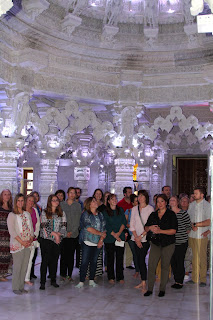Today we
learned about Hinduism's beliefs, behaviors and belonging to the community by
listening to a couple of lectures, one from our instructor Seth Brady, as well
as from Shereen Bhalla, from the Hindu American Foundation. Additionally,
we had the great pleasure of learning from current and past students of
District 203 who discussed the traditions, values, and norms from their
personal experiences. Our group also had
an opportunity to visit two different Hindu temples today, the Venkateswara
Sami (Balaji) Temple of Greater Chicago and BAPS Swaminarayan Temple.
Today, I was once again blown away by how much I did not know or
misunderstood about Hinduism and am grateful for this opportunity to be on this
religious literacy journey. I'll be honest as I write this post, I'm
still trying to wrap my brain around it as it's so diverse, dynamic,
changing, and situated in such long, rich culture.
Core beliefs
Hinduism is one of the oldest
major faith traditions and is the world's third largest religion. The
majority of Hindus believe that that "Brahman" or "the
Absolute" is pervasive in the universe. Essentially, it is believed
that Brahman is "the one" and "God". Hindu's believe that "Brahaman" is
present in all living beings. "God" spread out as the universe
in to all living beings and elements and is understood as the cause of
creation. Additionally, in Hindu lore,
there is a Hindu trinity of Bhrama (creation), Vishnu (sustenance), and Shiva
(dissolution/reincarnation). Hindu's believe that the soul is eternal and
when a physical body dies, the soul is reborn in another living thing which is
governed by the Law of Karma. People are
believed to strive for: Dharma (i.e. foundation of moral life, small acts that
you do to get the good karma), Artha (i.e. pursuit of material prosperity),
Kama (i.e. enjoyment of the material world), and Moksha (i.e. the ultimate goal
of reincarnation). In order to achieve Moksha, one must follow three
paths: Karma Yoga (i.e. performing one's duty selflessly), Jnana Yoga (i.e.
studying and contemplating the scriptures), and Bhakti Yoga (i.e. devotion and
service)
Religions are always internally diverse.
It
became clear as I began my readings on Hinduism that the religion was quite
diverse but became even more clear upon visiting these two very different Hindu
temples and listening to the students panel. Outside of the core beliefs,
there is a broad spectrum of
understanding and practices. Throughout
the reading, the words "some, many, most" were used frequently when
describing what Hindu's believe, how they behave, and how they belong. As
one of the Hindu students from the panel stated there are "no hard or fast rules for
Hinduism. Another student shared that
"it wouldn't be possible to compare two Hindu households as no two Hindu
household is the same". They shared
that their rituals and practices can even vary between family members of the
same household. As we visited the two different Hindu temples, it became
very clear that they also come in different forms. While Indian geography certainly can account
for some of the diversity, the evolution of time may also play a role. For example, the first temple we visited was
humble and welcoming. Hindu worshippers
took time after worshipping to ask why we were there and then offered to
explain various aspects of their temple to our group. The other temple
was extremely ornate, with amazing wood and marble carvings but appeared to be
more focused on customs and traditions. Both
beautiful temples but were notably different in their beliefs and behavior.
Religions
are always situated in culture.
Hinduism
is a collection of traditions or as the Hindu student from today's panel
described, a way of life. Each of the students on the student panel
shared that Hinduism is more than a religion but rather a part of their lives.
They also shared that Indian culture and Hinduism are so intertwined that
it is difficult to separate. Shereen
Bhalla, from the Hindu American Foundation, also stated that there isn't a
specific founder, doctrine, or creed, but rather that Hinduism is a way of
life.
Religions are dynamic and
changing.
In early Hinduism, many Hindus
focused on rituals but over time it moved away from rituals and began to share
stories across generations and continents that became guides for how to lead a
moral and righteous life. As Buddhism and Jainism gained prominence in
India, Hinduism moved away from ritual and text and into personal
devotion. Later as British rule and
colonization happened, some Hinduism practices became more rigid and other
Hindu practices reformed.
There is SO much more I learned
today but I am just too exhausted after trying to wrap my brain around it all!
Another busy, exhausting, but enlightening day. Tomorrow Judaism and Christianity.
:)
Good night!!
Becky
6.12.19 I had an opportunity to read Melanie Pace's blog post about her review of our day @https://setthepaceblog.wordpress.com/2019/06/11/reflection-of-day-2/ I appreciated reading about so many facts that I didn't think to add to my post. I feel like she had a better understanding of some of the traditions then I was able to put to paper.











I love the way your organized your blog and shared your thoughts Becky. Karen
ReplyDelete